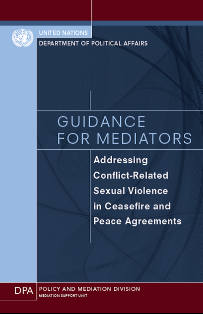With the aim of preventing and responding to conflict-related sexual violence as part of peace and political efforts, the Gender, Peace and Security and the Mediation Support Units address conflict-related sexual violence as a priority issue across relevant peacemaking contexts. The Units ensure consideration of the issue in developing expert guidance on key thematic issues, including on designing ceasefires, undertaking local mediation efforts and mediation around natural resources.
Addressing Sexual Violence in Conflict in Ceasefire and Peace Agreements
In today’s violent conflicts, civilians continue to be deliberate targets of war in contravention of the Geneva Conventions. One of the most devastating forms of violence waged against civilians is conflict-related sexual violence. A form of gender-based violence, women and girls disproportionately bear the brunt of conflict-related sexual violence, although men, boys and LGBTI persons are also targeted.
Conflict-related sexual violence is as old as war itself. It has been used as a method of warfare for time immemorial and in conflicts ranging from World War II to Bosnia, the Democratic Republic of Congo to Colombia, Myanmar to the Syrian Arab Republic and Iraq to Sudan. It is a grave human rights violation that is used as a tactic of war and terrorism to displace populations, traumatize communities, undermine ethics, cultural family and community cohesion and violate women’s reproductive rights. Highly effective, its use can instill fear in communities, trigger acts of vengeance and renewed violence, undermine peace and mediation efforts, and cause stigma and isolation, health, psychological and reproductive trauma, and intergenerational educational, economic and political impacts for survivors and their families.
Depending on the circumstances of an offense, conflict-related sexual violence can constitute a war crime, crime against humanity, act of torture, or constituent act of genocide, under the Rome Statute of the International Criminal Court. The Security Council has recognized in a series of resolutions sexual violence, when used as a method or tactic of war or terrorism, to constitute a threat to international security and an impediment to peace. In recognition that the effective prevention, deterrence and response to conflict-related sexual violence requires political leadership and accountability, and a survivor-centered approach, DPPA has prioritized addressing conflict-related sexual violence as a fundamental part of its women, peace and security and mediation work.
The United Nations requires its mediators to address conflict-related sexual violence. In 2012, the Department of Political Affairs (DPA) issued Guidance for Mediators: Addressing Conflict-Related Sexual Violence in Ceasefire and Peace Agreements.
Key principles include an obligation to engage parties in discussing the issue and to work towards firm commitments to cease all acts of conflict-related sexual violence. The guidelines also require that conflict-related sexual violence be included in the definition of acts covered by a ceasefire, be monitored alongside other potential violations of ceasefires, and are excluded from amnesty provisions.
Sudan: 3 October 2020 Juba Agreement for Peace in Sudan
Following the 2019 overthrow of President Al-Bashir in Sudan, the Juba Agreement for Peace was negotiated between the transitional Government of Sudan and several armed movements, including inter alia the Sudan Liberation Army-Minni Minawi faction, the Justice and Equality Movement, and the Sudan People’s Liberation Movement-North Malik Agar faction. The Agreement aimed to end the conflicts that had plagued Sudan for decades and includes several region-specific protocols and one protocol on national issues.
The Agreement contains provisions that:
- List sexual violence against women, which constitutes a violation of international law and relevant domestic law, as a prohibited act under the Agreement's Permanent Ceasefire and Final Security Agreement Protocol.
- Exclude sexual violence from the scope of general amnesty in the Agreement.
- Stipulate the Parties to the Agreement shall pay special attention to protecting internally displaced and refugee women, children, and all other vulnerable groups from all forms of harassment, exploitation, and sexual- or gender-based violence
Videos
Documents

This Handbook is intended to serve as a practical guide to support the implementation of the CRSV mandate by United Nations Field Missions, including Peacekeeping Operations and Special Political Missions. It serves both as a guidance for civilians, military, and police personnel deployed to United Nations Field Missions and as a pre-deployment orientation tool for future Mission personnel.

Prepared in response to the request of the General Assembly and in conformity with the Charter of the United Nations, the Guidance aims to inform the design and management of mediation processes. It is intended as a resource for mediators, States and other actors supporting mediation efforts but is also relevant for conflict parties, civil society and other stakeholders.



